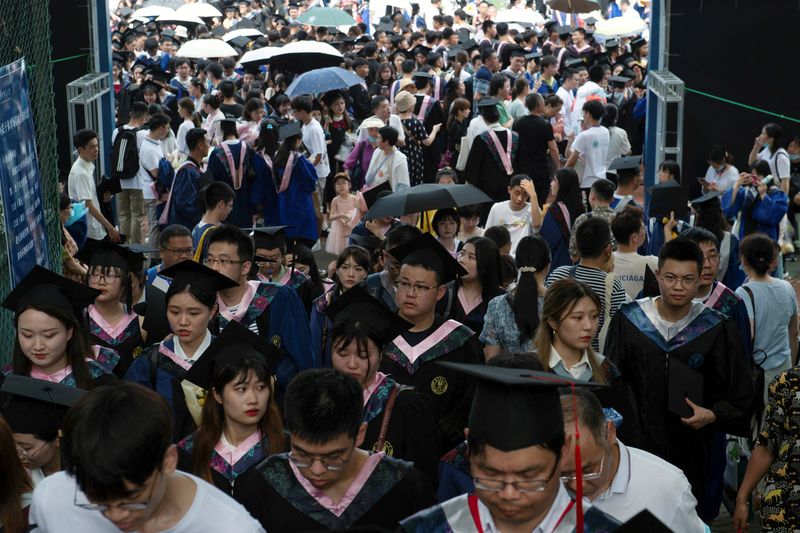Chinese professor says youth jobless rate might have hit 46.5%
2023.07.20 04:12

© Reuters. FILE PHOTO: Graduates, including students who could not attend last year due to the coronavirus disease (COVID-19) pandemic, attend a graduation ceremony at Central China Normal University in Wuhan, Hubei province, China June 13, 2021. Picture taken June
BEIJING (Reuters) – An unusually public claim by a Chinese professor that the country’s youth unemployment rate might have hit close to 50% in March has revived a debate about official statistics and focused attention on a weak labour market.
The National Bureau of Statistics said that month’s jobless rate for people between the ages of 16 and 24 was 19.7%, less than half of what Peking University professor Zhang Dandan estimated.
If 16 million non-students “lying flat” at home or relying on their parents were included, the rate could have been as high as 46.5%, Zhang wrote in an online article in Caixin, a respected financial magazine.
Zhang is associate professor of Economics at the university’s National School of Development. Her article, originally published on Monday, has since been removed.
The official youth jobless rate, which only includes people actively seeking work, rose to a record 21.3% in June after the world’s second-biggest economy lost steam in the second quarter. Policymakers have struggled to put the economy on a more stable footing since the COVID-19 pandemic.
Zhang’s research focused in part on the impact of the outbreak on the manufacturing hubs of Suzhou and Kunshan in eastern China.
“Employment there only recovered to two-thirds of pre-COVID levels till March, when COVID faded,” she wrote. “Young people remain major workers in the manufacturing sector, so they were hit more badly.”
Additionally, regulations introduced since 2021 in the tutoring, property and online platform sectors have disproportionately hit young employees and the well-educated, she said.
Calls by Reuters to Zhang’s work phone went unanswered and the statistics bureau did not immediately respond to a request for comment.
One user on China’s popular Twitter-like microblog Weibo (NASDAQ:) criticised Zhang’s article on Thursday, saying her statistical methodology was flawed, as economists generally do not count people who are not actively seeking work when compiling estimates for joblessness.
But other social media users focused on how hard it is still to find a job in China.
“The reason why so many graduate students flock to sit postgraduate or civil servant exams instead of looking for jobs is because they just cannot find jobs,” according to one Weibo post.








